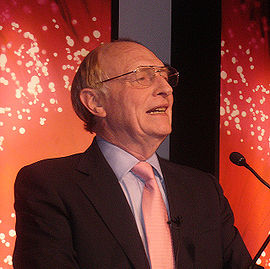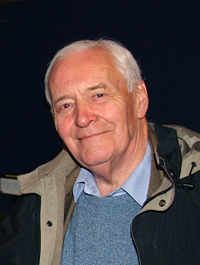_leadership_election,_1988.gif)
Labour Party (UK) leadership election, 1988
Encyclopedia


Tony Benn
Anthony Neil Wedgwood "Tony" Benn, PC is a British Labour Party politician and a former MP and Cabinet Minister.His successful campaign to renounce his hereditary peerage was instrumental in the creation of the Peerage Act 1963...
, identified with the left-wing of the British Labour Party
Labour Party (UK)
The Labour Party is a centre-left democratic socialist party in the United Kingdom. It surpassed the Liberal Party in general elections during the early 1920s, forming minority governments under Ramsay MacDonald in 1924 and 1929-1931. The party was in a wartime coalition from 1940 to 1945, after...
, challenged the incumbent Neil Kinnock
Neil Kinnock
Neil Gordon Kinnock, Baron Kinnock is a Welsh politician belonging to the Labour Party. He served as a Member of Parliament from 1970 until 1995 and as Labour Leader and Leader of Her Majesty's Loyal Opposition from 1983 until 1992 - his leadership of the party during nearly nine years making him...
. The challenge arose shortly after the Labour Party had lost the 1987 general election
United Kingdom general election, 1987
The United Kingdom general election of 1987 was held on 11 June 1987, to elect 650 members to the British House of Commons. The election was the third consecutive election victory for the Conservative Party under the leadership of Margaret Thatcher, who became the first Prime Minister since the 2nd...
(though it had reduced the majority that the Conservative
Conservative Party (UK)
The Conservative Party, formally the Conservative and Unionist Party, is a centre-right political party in the United Kingdom that adheres to the philosophies of conservatism and British unionism. It is the largest political party in the UK, and is currently the largest single party in the House...
government had established at the previous election
United Kingdom general election, 1983
The 1983 United Kingdom general election was held on 9 June 1983. It gave the Conservative Party under Margaret Thatcher the most decisive election victory since that of Labour in 1945...
four years earlier), the expulsion of some far left
Far left
Far left, also known as the revolutionary left, radical left and extreme left are terms which refer to the highest degree of leftist positions among left-wing politics...
Labour Party members in 1986, and the production of a document intended to replace Clause IV
Clause IV
Clause IV historically refers to part of the 1918 text of the British Labour Party constitution which set out the aims and values of the party. Before its revision in 1995, its application was the subject of considerable dispute.-Text:...
of the party's constitution, removing the commitment to nationalisation of leading industries.
Benn and Kinnock were only two candidates in the election. The ballot took place on 2 October 1988. Affiliated organisations had 40% of the vote, while Constituency Labour Parties and the Parliamentary Labour Party had 30% each in the electoral college
Electoral college
An electoral college is a set of electors who are selected to elect a candidate to a particular office. Often these represent different organizations or entities, with each organization or entity represented by a particular number of electors or with votes weighted in a particular way...
.
| Candidate | Affiliated Affiliated trade union In British politics, the term affiliated trade union refers to a trade union that has an affiliation to the British Labour Party.The Party was created by the trade unions and socialist societies in 1900 as the Labour Representation Committee... | Constituency Constituency Labour Party A Constituency Labour Party is an organisation of members of the British Labour Party who live in a particular UK parliamentary constituency in England, Scotland and Wales. The Labour Party in Northern Ireland has, since February 2009, been organised as a province-wide Constituency Labour Party... | Parliamentary Parliamentary Labour Party In UK politics, the Parliamentary Labour Party is the parliamentary party of the Labour Party in Parliament: Labour MPs as a collective body.... | Total | |
|---|---|---|---|---|---|
| Neil Kinnock Neil Kinnock Neil Gordon Kinnock, Baron Kinnock is a Welsh politician belonging to the Labour Party. He served as a Member of Parliament from 1970 until 1995 and as Labour Leader and Leader of Her Majesty's Loyal Opposition from 1983 until 1992 - his leadership of the party during nearly nine years making him... |
39.7 | 24.1 | 24.8 | 88.6 | |
| Tony Benn Tony Benn Anthony Neil Wedgwood "Tony" Benn, PC is a British Labour Party politician and a former MP and Cabinet Minister.His successful campaign to renounce his hereditary peerage was instrumental in the creation of the Peerage Act 1963... |
0.3 | 5.9 | 5.2 | 11.4 |
With a clear majority, Neil Kinnock remained leader of the Labour Party. He served until his resignation in 1992, which precipitated another leadership election
Labour Party (UK) leadership election, 1992
The Labour Party leadership election of 1992 followed the Labour Party's failure to win the 1992 general election and the subsequent resignation of party leader Neil Kinnock....
.
See also
- 1988 Labour Deputy Leadership electionLabour Party (UK) deputy leadership election, 1988A Labour party deputy leadership election took place on October 2, 1988 when John Prescott and Eric Heffer challenged Labour's incumbent Deputy Leader Roy Hattersley. Hattersley had served in the position since 1983....

